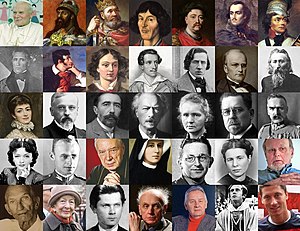
Back Pole (volk) Afrikaans Polacos AN بولنديون Arabic Полякал AV Polyaklar Azerbaijani لهیستانلار AZB Поляктар Bashkir Lėnkā BAT-SMG Палякі Byelorussian Палякі BE-X-OLD
 | |
| Tipu | etnia y Pueblu |
|---|---|
| Población total | 55 000 000 |
| Llingua | polacu |
| Relixón | catolicismu, cristianismu ortodoxu y Protestantismu |
| Periodu | sieglu X - |
| Xeografía | |
| Estáu | Polonia, Estaos Xuníos, Alemaña, Brasil, Francia, Canadá, Reinu Xuníu, Bielorrusia, Lituania, Ucraína, Suecia, Noruega, Rusia, Letonia, Chequia y Kazakstán |
| [1][2] | |
| [3] | |
| [4][5][6] | |
| [7] | |
| [8] | |
| [4][9] | |
| [10] | |
| [11] | |
| [12] | |
| [13] | |
| [11] | |
| [14] | |
El pueblu polacu o a cencielles polacos (polacu:Polacy, singular Polak) son un pueblu d'orixe étnicu eslavu d'Europa Central, concentráu principalmente en redol al territoriu de l'actual Polonia. Dacuando los polacos son definíos como un pueblu que comparte una cultura polaca común y son descendientes de polacos. La so principal relixón ye'l catolicismu. El términu polacu tamién puede utilizase ensin conteníu étnico referíu a los ciudadanos de Polonia al marxe del so etnicidad. Esiste una importante diáspora polaca n'Europa Occidental y Oriental, América y Australia.
Nun esiste una definición comúnmente aceptada de la significación de "polacu". Acordies con el preámbulu de la Constitución de Polonia, la nación polaca consiste en tolos ciudadanos de Polonia. Sicasí, como na mayoría de los países europeos, munches persones llinden esi grupu a los falantes nativos del idioma polacu, persones que comparten ciertu costumes y tradiciones o persones que comparte una fonderada étnica orixinariu de Polonia. Polo que se refier a los sos oríxenes, el nome de la nación tien un orixe indoeuropéu, deriváu de pulgue; pole,[15] que significa llanura. Los polacos pertenecen al grupu lechítico de los eslavos. Los polonos de Giecz, Gniezno y Poznań yeren la más influyente de les tribus eslaves de la Polonia altomedieval y consiguieron xunir a otres munches tribus eslaves occidentales sol gobiernu de lo que se convertiría na dinastía Piast, creando un nuevu estáu. La pallabra polaca pa designar al pueblu ye Polak (masculín) y Polka (femenín).
- ↑ Excel spreadsheet from Polish Central Statistical Office
- ↑ https://web.archive.org/web/20081004044820/http://www.stat.gov.pl/gus/45_4520_PLK_HTML.htm
- ↑ USA National Census 2000. Ancestries With 100,000 or More People in 2000.
- ↑ 4,0 4,1 Error de cita: La etiqueta
<ref>nun ye válida; nun se conseñó testu pa les referencies nomaesSwiat_Polonii - ↑ (n'alemán) Erstmals mehr als 16 Millionen Menschen mit Migrationshintergrund in Deutschland Statistisches Bundesamt Deutschland (German text about migrants in Germany)
- ↑ (en polacu) Raport o sytuacji Polonii i Polaków za granicą 2009. Ministerstwo Spraw Zagranicznych 2009. p. 177, ISBN 978-83-89607-81-2
- ↑ Article on Ynet news site, Hebrew (Google translator).
- ↑ https://web.archive.org/web/20110115234252/http://www40.statcan.gc.ca/l01/cst01/demo26a-eng.htm
- ↑ (n'inglés)British Office for National Statistics, Population by Country of Birth & Nationality, Jan 2009 to Dec 2009
^ (n'inglés) "UK lets in more Poles than there are in Warsaw", Steve Doughty, Daily Mail; see also: "Record numbers leave Britain as Poles head home - but new arrivals increase to half a million" by James Slack, Daily Mail, November 27, 2009. Please note: The British Office for National Statistics recorded the number of Poles who have travelled to the UK in 2006 at over 2,000,000; they are not to be mistaken for permanent residents. - ↑ Belarus National Census 2009 (preliminary results)(in rus.)
- ↑ 11,0 11,1 2006 Census Community Profile Series : Australia
- ↑ «Copia archivada». Archiváu dende l'orixinal, el 6 de setiembre de 2012. Consultáu'l 3 d'avientu de 2011.
- ↑ Poles in Ireland
- ↑ Poles in Ukraine
- ↑ "fr. pal, pulgue, altd. pal, pael, dn. pael, sw. pale, isl. pall, bre. pal, peul, it. polu, pole, pila, [in:] A dictionary of the Anglo-Saxon languages. Joseph Bosworth. S.275.; planus, plain, flat; from Indo- Germanic pulgue, flat, to spread, also the root of words like plan, floor, and field. [in:] John Hejduk. Soundings. 1993. p. 399"; "the root pulgue is the source of the English words "field" and "floor". The root "plak" is the source of the English word "flake" [in:] Loren Edward Meierding. Ace the Verbal on the SAT. 2005. p. 82
© MMXXIII Rich X Search. We shall prevail. All rights reserved. Rich X Search